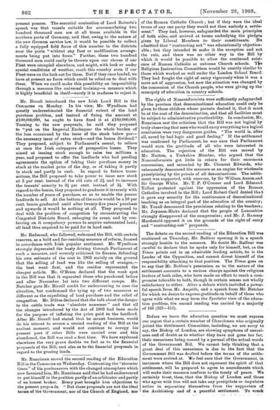Mr. Redmond, who followed, welcomed the Bill, with certain reserves,
as a bold and far-reaching measure of reform, framed in accordance with Irish popular sentiment. Mr. Wyndham strongly deprecated the hasty driving through Parliament of such a measure, and severely criticised its finance, defending hie own estimate of the cost in 1903 mainly on the ground that the selling of land was like the selling of oranges,— the best went first, and the residue represented the cheaper article. Mr. O'Brien declared that the weak spot in the Bill was that it separated those who purchased before and after November 1st into two different camps. lir. Butcher gave Mr. Birrell credit for endeavouring to ease the situation, but condemned the tying up of two measures so different as the expediting of land purchase and the relief of congestion. Mr. Dillon declared that the. talk about the danger to the cattle trade was "absolute nonsense" and that all the changes introduced by the Act of 1903 bad been made for the purpose of inflating the price paid to the landlord. After Mr. Birrell had stated that he meant business, would do his .uttnost to secure a second reading of . the Bill at the earliest moment; and would not continue to occupy his present post if other Bills were carried over and this abandoned, the Bill was read a first time. We have exrAssed elsewhere the very grave doubts we feel as to the financial proposals of the Bill, and also as to the financial proposals in regard to the grazing lands.


















































 Previous page
Previous page